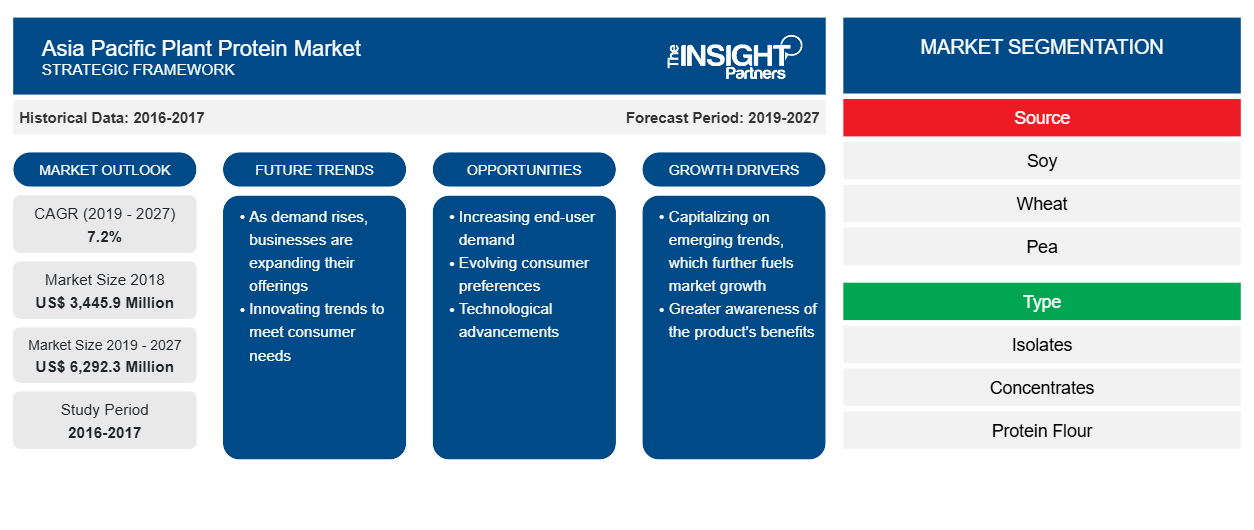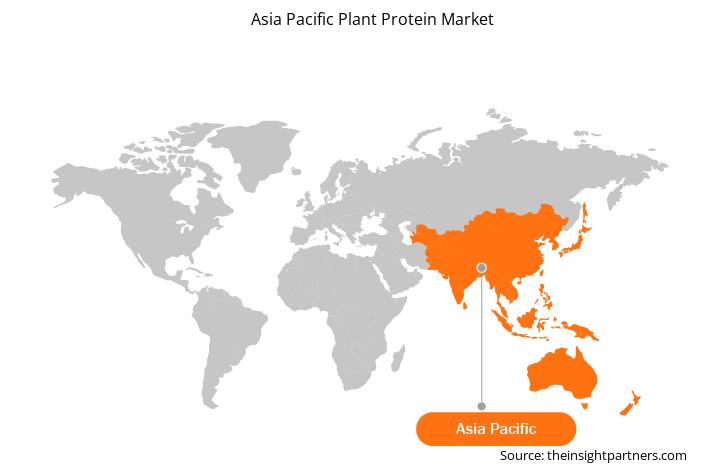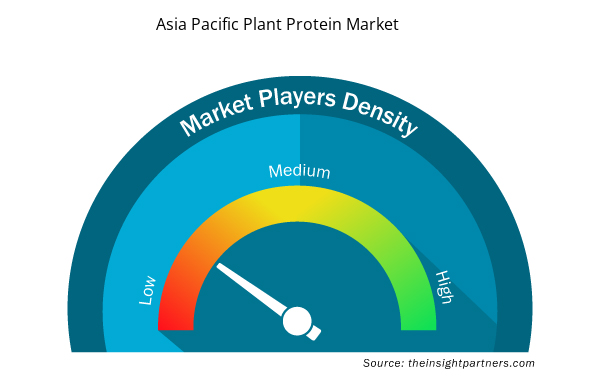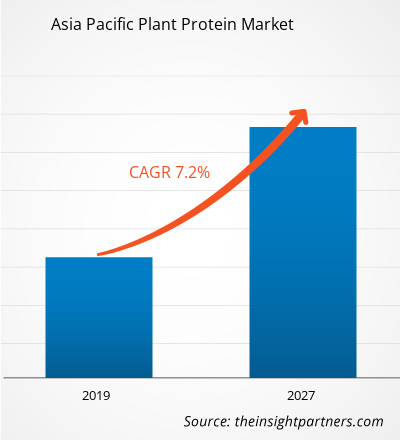The Asia Pacific plant protein market accounted for US$ 3,445.9 Mn in 2018 and is predicted to grow at a CAGR of 7.2% during the forecast period 2019 – 2027, to account for US$ 6,292.3 Mn by 2027.
Plant protein is a natural protein derived from plant sources such as soy, wheat, pea, and others. Plant protein provides building blocks for healthy muscles and tissues in the human body and is also beneficial for weight loss. Plant-based proteins tend to be lower in calories and fat as compared to animal proteins but higher in fiber and essential nutrients.
In 2018, China dominated the Asia Pacific plant protein market, followed by rest of Asia Pacific. The plant protein market in China is characterized by the presence of many small and large-scale players operating in the country. The Chinese economy is flooded with manufacturing and assembly units of a few major manufacturers of food and beverages, cosmetics, and personal care products. Rising production capacities of these products is creating a strong demand for plant protein. Additionally, China has the largest population in APAC, and this leads to the growing demands for food and beverages, cosmetics and personal care products, which, in turn, will lead to the growth of the plant protein market in China. The low manufacturing and capital costs in China attract new investment and better opportunities for food and beverage businesses in the region. It is considered to be the second-largest economy in the world and exhibits potential growth for the market in the forthcoming years. According to the China Cuisine Association, the food & beverages industry of China was valued at ~US$ 636 billion in 2018. Thus, growing food & beverages industry is expected to boost the plant protein market in the upcoming years.
Asia Pacific Plant Protein Market

- This FREE sample will include data analysis, ranging from market trends to estimates and forecasts.
- This FREE sample will include data analysis, ranging from market trends to estimates and forecasts.
Market Insights
Rising consumer awareness about protein-rich food
Proteins are building blocks to maintain the structure and functions of the human body. Proteins are made up of amino acids that are attached by peptide bonds in long chains. There are 20 different kinds of amino acids linked together that determines the role of protein in the human body. Proteins play a key role in transporting molecules throughout the body by helping in cell repair and protecting the body from viruses and bacteria. It also promotes proper growth and development in children, teenagers, and pregnant women. People consuming more protein tend to maintain bone mass better and have a much lower risk of osteoporosis and fractures. High protein intake has resulted in boosting metabolism that results in the burning of a high amount of calories. This further helps in proper weight management and weight loss. These benefits of protein are attracting consumers towards protein-rich food and beverages available in the market. This further creates a huge demand for plant proteins across Asia Pacific.
Source Insights
Based on source, the Asia Pacific plant protein market is bifurcated as soy, wheat, pea, and others. The soy segment led the Asia Pacific plant protein market by source. Soy protein isolate is a highly refined form of soy protein, with a protein content of minimum 90%. It is made from defatted soy flour from which most of the non-protein components, including fats and carbohydrates, are removed. Soy protein powder is made from defatted soybean flakes washed in either alcohol or water to remove the sugars and dietary fibers. They are then dehydrated and ground into powder. Soy protein powder is used to make infant soy formulae, as well as a variety of meat and dairy alternatives. Soy protein concentrates typically contain 70% soy protein and is basically defatted soy flour without the water-soluble carbohydrates. This form of protein is made by removing part of the carbohydrates from dehulled and defatted soybeans. Soy flour is made by grinding soybeans into a fine powder.
Type Insights
The Asia Pacific plant protein market is bifurcated based on type into isolates, concentrates, and protein flour. The isolates segment held a significantly large share of the Asia Pacific plant protein market in 2018. Plant protein isolates include an additional filtering process that removes more fat and carbs, further concentrating the protein. Plant protein isolate powders contain about 90–95% protein. It is a type of protein powder that has undergone more processing as compared to protein concentrate. The processing of this type of protein isolate includes cooking and decanting of fat and other low protein portions to separate and collect the purest protein. The additional processing help to isolate the protein from sources such as soy, wheat, and pea and separating it from the fat, lactose, and gluten. As a result, plant protein isolates deliver more protein with fewer calories. Furthermore, plant protein isolates are easy to digest because common troublemakers like gluten and lactose are removed as the protein is highly purified.
Application Insights
The Asia Pacific plant protein market is bifurcated based on application into protein beverages, dairy alternatives, meat alternatives and meat extenders, protein bars, bakery, and others. The meat alternatives and meat extenders segment accounted for a major share in the Asia Pacific plant protein market. Beans and legumes are affordable sources of plant protein that serve as a meat substitute. Soy is also among the major source for producing meat alternatives. Pea protein isolates are mainly used by meat-alternative manufacturers such as Daiya, Gardein, Ben & Jerry's, Beyond Meat, Just Mayo, and Ripple Foods, among others. Therefore, surge in demand and production for meat alternatives results in higher demand for plant proteins. The demand for meat alternatives is increasing due to growing health concerns among consumers and growing preference for vegan food. Further, rising obesity levels due to the consumption of meat and meat products have led to an increasing consumer preference for meat substitutes.
Asia Pacific Plant Protein Market by Type

- This FREE sample will include data analysis, ranging from market trends to estimates and forecasts.
Customize This Report To Suit Your Requirement
You will get customization on any report - free of charge - including parts of this report, or country-level analysis, Excel Data pack, as well as avail great offers and discounts for start-ups & universities
Asia Pacific Plant Protein Market: Strategic Insights

- Get Top Key Market Trends of this report.This FREE sample will include data analysis, ranging from market trends to estimates and forecasts.
You will get customization on any report - free of charge - including parts of this report, or country-level analysis, Excel Data pack, as well as avail great offers and discounts for start-ups & universities
Asia Pacific Plant Protein Market: Strategic Insights

- Get Top Key Market Trends of this report.This FREE sample will include data analysis, ranging from market trends to estimates and forecasts.
New product development, market initiatives and merger and acquisition were observed as the most adopted strategies in Asia Pacific plant protein market. Few of the recent developments in the Asia Pacific plant protein market are listed below:
2019:
DuPont Nutrition & Biosciences expanded its plant protein range under the brand DuPont Danisco which features pea and soy protein options and adds crunchy texture and higher protein content to snacks, cereals, nutritional bars and more.
2019:
Roquette announced the expansion of its range of premium plant-based proteins for the meat alternative which could support the development of new opportunities for plant-based food innovators.
2019:
DSM partnered with Avril, so as to work together to meet the growing consumer demand for plant-based proteins. Together, both the companies are aiming to launch canola protein food ingredient.
ASIA PACIFIC PLANT PROTEIN MARKET SEGMENTATION
By Source
- Soy,
- Wheat
- Pea
- Others
By Type
- Isolates
- Concentrates
- Protein Flour
By Application
- Protein Beverages
- Dairy Alternatives
- Meat Alternatives and Meat Extenders
- Protein Bars
- Bakery
- Others
By Country
- Australia
- China
- India
- Japan
- South Korea
- Rest of APAC
Company Profiles
- E. I. Du Pont De Nemours and Company
- Archer Daniels Midland Company
- Kerry Group
- Koninklijke DSM N.V.
- Axiom Foods, Inc
- Cargill, Incorporated
- Roquette Frères
- Ingredion Incorporated
- Glanbia plc
Asia Pacific Plant Protein Market Regional Insights
The regional trends and factors influencing the Asia Pacific Plant Protein Market throughout the forecast period have been thoroughly explained by the analysts at Insight Partners. This section also discusses Asia Pacific Plant Protein Market segments and geography across North America, Europe, Asia Pacific, Middle East and Africa, and South and Central America.

- Get the Regional Specific Data for Asia Pacific Plant Protein Market
Asia Pacific Plant Protein Market Report Scope
| Report Attribute | Details |
|---|---|
| Market size in 2018 | US$ 3,445.9 Million |
| Market Size by 2027 | US$ 6,292.3 Million |
| Global CAGR (2019 - 2027) | 7.2% |
| Historical Data | 2016-2017 |
| Forecast period | 2019-2027 |
| Segments Covered |
By Source
|
| Regions and Countries Covered | Asia-Pacific
|
| Market leaders and key company profiles |
Asia Pacific Plant Protein Market Players Density: Understanding Its Impact on Business Dynamics
The Asia Pacific Plant Protein Market is growing rapidly, driven by increasing end-user demand due to factors such as evolving consumer preferences, technological advancements, and greater awareness of the product's benefits. As demand rises, businesses are expanding their offerings, innovating to meet consumer needs, and capitalizing on emerging trends, which further fuels market growth.
Market players density refers to the distribution of firms or companies operating within a particular market or industry. It indicates how many competitors (market players) are present in a given market space relative to its size or total market value.
Major Companies operating in the Asia Pacific Plant Protein Market are:
- E. I. Du Pont De Nemours and Company
- Archer Daniels Midland Company
- Kerry Group
- Koninklijke DSM N.V.
- Axiom Foods, Inc
Disclaimer: The companies listed above are not ranked in any particular order.

- Get the Asia Pacific Plant Protein Market top key players overview
- Historical Analysis (2 Years), Base Year, Forecast (7 Years) with CAGR
- PEST and SWOT Analysis
- Market Size Value / Volume - Global, Regional, Country
- Industry and Competitive Landscape
- Excel Dataset



Report Coverage
Revenue forecast, Company Analysis, Industry landscape, Growth factors, and Trends

Segment Covered
Source, Type, Application, and Countries

Regional Scope
North America, Europe, Asia Pacific, Middle East & Africa, South & Central America

Country Scope
Australia, China, Japan, South Korea
Trends and growth analysis reports related to Food and Beverages : READ MORE..
List of Companies – Asia Pacific Plant Protein Market
- E. I. Du Pont De Nemours and Company
- Archer Daniels Midland Company
- Kerry Group
- Koninklijke DSM N.V.
- Axiom Foods, Inc
- Cargill, Incorporated
- Roquette Frères
- Ingredion Incorporated
- Glanbia plc

 Get Free Sample For
Get Free Sample For